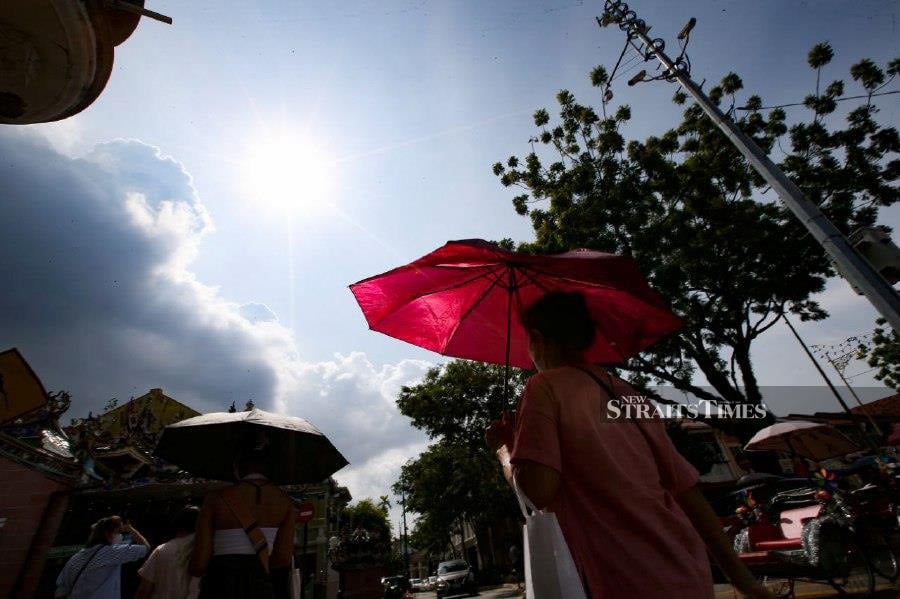
KUALA LUMPUR: The Health Ministry has sounded the alarm over the prevailing hot weather that is set to be followed by the El Nino phenomenon in May, which will herald hot and dry conditions.
In a directive issued yesterday, the ministry prohibited any outdoor activities in areas with Air Pollution Index readings above 100 and advised students to stay hydrated to regulate their body temperature.
The preventive measures were issued to the state Education Departments, district education offices and all of its educational institutions to deal with the hot weather and haze.
The directive came in the wake of the deaths of two children in Kelantan, who had reportedly died of heatstroke on Tuesday.
"To ensure that students' health is not impacted, any activities that might expose them to hot weather conditions will be monitored and perhaps postponed.
"Students are urged to bring their own drinking water, but if the situation gets critical, drinking water will also be provided.
"Always be alert and cooperate with clinics and hospitals in case there are any problems with the students due to the heat."
The ministry advised all of its educational institutions to adhere to the guidelines set and to be aware of recent events surrounding the haze phenomenon in their particular locations or districts through the media.
The Malaysian Meteorological Department (MetMalaysia) announced on April 14 that the transition to El Nino, which would bring hot and dry weather, is expected to occur around May to July this year.
However, many areas of the peninsula, save for the Klang Valley, have begun experiencing hot weather.
According to the MetMalaysia website, the average temperature in most states hovered between 33°C and 34°C. Perlis, it was noted, had a high of 35°C.
Meanwhile, health experts urged parents to take the precautions to avoid more potential heatstroke fatalities among children.
Universiti Malaya occupational and public health expert Professor Dr Victor Hoe said parents had to be aware of the dangers of heatstroke among children.
Heatstroke, he said, was an acute event due to exposure to extreme heat and was the most severe form of heat-related illness.
"The signs of heatstroke include confusion, altered mental status, slurred speech, loss of consciousness (coma), hot and dry skin, profuse sweating, and seizures. It can be fatal if treatment is delayed."
Parents should also be able to recognise the symptoms of early stages of heat-related illness, which include heat cramps and heat exhaustion.
"The symptoms of heat cramps are painful muscle cramps and spasms that occur during or after intense exercise," Dr Hoe said.
"Meanwhile, heat exhaustion occurs when the body is unable to cool itself properly. The symptoms include headache, nausea, elevated body temperature and excessive sweating."
He also advised parents to remove their children from a hot environment when they developed symptoms related to heatstroke.
"Parents should also remove their children from strenuous activities like sports and outdoor activities.
"When they are playing in a hot environment, they need to drink plenty of plain water, as it is the most effective fluid to keep children hydrated."
Hydration, said Dr Hoe, was the key factor in preventing heatstroke, which is why parents should check their children's urine colour to identify if they are well hydrated or dehydrated.
"Pale, odourless and plentiful urine indicates that they are wellhydrated, and darker, strong-smelling urine in small amounts can be a sign of dehydration.
"And although nutrition is not the main key to preventing heatstroke, an undernourished child will be more susceptible to the effects of the heat."
Public health expert Datuk Dr Zainal Ariffin Omar also advised parents not to take the matter lightly as heatstroke can result in death.
"My advice is to make sure the children stay hydrated during the current hot weather by drinking plenty of water, either plain water or fruit juice, and eating plenty of fruits and vegetables.
"If the children have another illness, do not let them be too active and exposed to the hot weather. Make sure they sit in a cool place and never leave them in the car."
Dr Zainal also said that it was important for parents to bathe and wet their children's bodies regularly as this would help cool down their body temperature. Additional reporting by Aqilah Alias